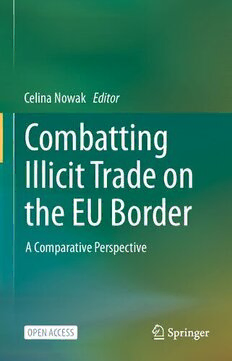
Combatting Illicit Trade on the EU Border: A Comparative Perspective PDF
Preview Combatting Illicit Trade on the EU Border: A Comparative Perspective
Celina Nowak Editor Combatting Illicit Trade on the EU Border A Comparative Perspective Combatting Illicit Trade on the EU Border Celina Nowak Editor Combatting Illicit Trade on the EU Border A Comparative Perspective Editor CelinaNowak InstituteofLawStudies PolishAcademyofSciences Warsaw,Poland ISBN978-3-030-51018-3 ISBN978-3-030-51019-0 (eBook) https://doi.org/10.1007/978-3-030-51019-0 Thisbookisanopenaccesspublication. ©TheEditor(s)(ifapplicable)andTheAuthor(s)2021 OpenAccessThisbookislicensedunderthetermsoftheCreativeCommonsAttribution4.0International License (http://creativecommons.org/licenses/by/4.0/), which permits use, sharing, adaptation, distribution and reproduction in any mediumor format, as long as you give appropriate credit to the originalauthor(s)andthesource,providealinktotheCreativeCommonslicenceandindicateifchanges weremade. Theimagesorotherthirdpartymaterialinthisbookareincludedinthebook’sCreativeCommonslicence, unlessindicatedotherwiseinacreditlinetothematerial.Ifmaterialisnotincludedinthebook’sCreative Commonslicenceandyourintendeduseisnotpermittedbystatutoryregulationorexceedsthepermitted use,youwillneedtoobtainpermissiondirectlyfromthecopyrightholder. Theuseofgeneraldescriptivenames,registerednames,trademarks,servicemarks,etc.inthispublication doesnotimply,evenintheabsenceofaspecificstatement,thatsuchnamesareexemptfromtherelevant protectivelawsandregulationsandthereforefreeforgeneraluse. Thepublisher,theauthors,andtheeditorsaresafetoassumethattheadviceandinformationinthisbook arebelievedtobetrueandaccurateatthedateofpublication.Neitherthepublishernortheauthorsorthe editorsgiveawarranty,expressedorimplied,withrespecttothematerialcontainedhereinorforany errorsoromissionsthatmayhavebeenmade.Thepublisherremainsneutralwithregardtojurisdictional claimsinpublishedmapsandinstitutionalaffiliations. ThisSpringerimprintispublishedbytheregisteredcompanySpringerNatureSwitzerlandAG. Theregisteredcompanyaddressis:Gewerbestrasse11,6330Cham,Switzerland Acknowledgements Thisstudy,conductedattheCentreforStudiesonEconomicCrimeintheInstituteof Law Studies, Polish Academy of Sciences, was funded by PMI IMPACT, a grant award initiative of Philip Morris International (PMI). In the performance of its research, the Institute of Law Studies, Polish Academy of Sciences, maintained full independence from PMI. The views and opinions expressed in this document are those of the research team and do not necessarily reflect the views of PMI. Responsibilityfortheinformationandviewsexpressedinthiscollectionliesentirely withtheInstituteofLawStudies,PolishAcademyofSciences.NeitherPMI,norany ofitsaffiliates,noranypersonactingontheirbehalfmaybeheldresponsibleforany useoftheinformationcontainedherein. Allerrorsarethoseoftheauthors. v Contents PartI Introduction Introduction:FightingAgainstIllicitTobaccoTradeintheEraofFast Change. . . . . . . . . . . . . . . . . . . . . . . . . . . . . . . . . . . . . . . . . . . . . . . . . . 3 CelinaNowak InternationalLegalFrameworkontheFightAgainstIllicitTobacco Trade:AnOverview. . . . . . . . . . . . . . . . . . . . . . . . . . . . . . . . . . . . . . . . 11 CelinaNowak PartII CriminalPolicywithRegardtoIllicitTobaccoTrade: NationalExperiencesandChallenges BetweenTaxes,CriminalLawandHealthCare:TheFightAgainst IllicitTobaccoTradeinGermany. .. . . . . .. . . . . . .. . . . . . .. . . . . .. . 29 MarcEngelhart TheItalianNationalLegalFrameworkRelatedtoIllicitTrade inTobaccoProducts. . . . . . . . . . . . . . . . . . . . . . . . . . . . . . . . . . . . . . . . 81 DanieleNegri PreventionofIllicitTradeinTobaccoProducts:Experience ofLithuania. . . . . . . . . . . . . . . . . . . . . . . . . . . . . . . . . . . . . . . . . . . . . . 107 GintarasŠvedas LegalandPracticalChallengesofCombatingIllicitTradeofTobacco inPoland. . . . . . . . . . . . . . . . . . . . . . . . . . . . . . . . . . . . . . . . . . . . . . . . 153 KonradBuczkowskiandPawełDziekański AComplexLegalFrameworkforaLackofLegalCertainty:Case StudyofRomania. . . . . . . . . . . . . . . . . . . . . . . . . . . . . . . . . . . . . . . . . . 213 SergiuBogdan vii viii Contents PreventionandRepressionofIllicitTradeinTobaccoProducts: ExperienceofSlovakia. . . . . . . . . . . . . . . . . . . . . . . . . . . . . . . . . . . . . . 253 LiborKlimek PartIII Conclusions Conclusions:CriminalPolicyonIllicitTobaccoTradeBetweenScylla ofHealthConcernsandCharybdisofFiscalInterests. . . . . . . . . . . . . . 277 KonradBuczkowskiandCelinaNowak Part I Introduction Introduction: Fighting Against Illicit Tobacco Trade in the Era of Fast Change CelinaNowak Contents 1 NationalCriminalPolicyasaPartofTobaccoControlPolicy:Justification oftheResearch................................................................................. 3 2 ScopeoftheBook,MethodologicalandTerminologicalConsiderations.................... 6 3 ResearchQuestions,StructureandContentoftheStudy..................................... 8 References.......................................................................................... 9 Abstract This chapter outlines the framework of the research presented in this volume. It starts with a notion that national criminal policies on illicit tobacco trade are a part of the national tobacco control policy, and at the same time a part ofageneralnationalcriminalpolicyandpointstotheneedforanin-depthresearch ofnationalcriminallawsinthisregard.Itpresentsthescopeoftheresearch,which consistsinacomparativeanalysisabouttheillicittobaccotradeandabouteffortsto counteract that trade in six EU Member States—four post-communist states (Lith- uania,Poland,SlovakiaandRomania),ontheEasternborderoftheUnionandtwo “old”EUMemberStates(Germany,Italy). 1 National Criminal Policy as a Part of Tobacco Control Policy: Justification of the Research Tobacco is the name commonly used to represent some plants in the Nicotiana genus, as well as products made with leaves of the tobacco plants. The latter is a substancethatishazardousforhumanhealth. C.Nowak(*) InstituteofLawStudies,PolishAcademyofSciences,Warsaw,Poland e-mail:[email protected] ©TheAuthor(s)2021 3 C.Nowak(ed.),CombattingIllicitTradeontheEUBorder, https://doi.org/10.1007/978-3-030-51019-0_1 4 C.Nowak Tobaccohasbeenwithmankindformillennia.Yet,itsexpansionasatradeitem forpersonalusedatestothesixteenthcenturyandthearrivaloftheEuropeanstothe Americas. In the twentieth century, scientists concluded that tobacco use is detri- mental to the health of its users. Tobacco has been identified by the World Health Organisation (WHO) as one of the four major risk factors that contribute to the developmentofnon-communicablediseases.Tobacco“accountsforover7.2million deathseveryyear(includingfromtheeffectsofexposuretosecond-handsmoke)”.1 The recent global rise of deaths attributed to non-communicable diseases has motivated international organisations to take action to prevent and control the risk factors.2 Controlling the production and controlling the use of tobacco have been significantpartsofthisprocess. The relationship between tobacco and individual country policies are complex. On the one hand, states are socially and politically committed to the reduction of tobaccouse.Ontheotherhand,statesbenefitfinanciallyfromtaxrevenuefromthe manufactureandsalesoftobaccoproducts.Fromthisperspective,therelationships stateshavewithtobaccoareliketheirrelationshipswithalcohol.Althoughtheuseof alcohol and tobacco constitute health hazards, they remain legal, unlike narcotic substances. As von Lampe justly states, “cigarettes are essentially a legal good”.3 However,statesarecommittedtofightingagainstrevenuelossfromthemanufacture and sale of tobacco products. The manufacture and trade of cigarettes are legal, provided these processes conform to the cigarette taxation rules adopted by states. Cigarettetradeisillegalwhenmanufacturersandsellersevadecigarettetaxes. National policies on the tobacco trade struggle to balance states’ fiscal interests with their responsibility to protect public health. This balance is mainly struck by pricingtobaccoproductsathighrates.AsstatedinArticle6.1oftheWHOFCTC, price and tax measures are effective means of reducing tobacco consumption by varioussegmentsofthepopulation,youngpeople,inparticular.Therefore,tobacco products are legal but taxable with the Value Added Tax (VAT) and excise taxes. Moreover, the EU Member States are obligated to apply the European minimum rates of the excise duty.4 This application is uniform because, as mentioned in the preambletothe2011Directive,“theleveloftaxationisamajorfactorinthepriceof tobacco products, which in turn influences consumers’ smoking habits. Fraud and smugglingunderminetaxinducedpricelevelsandthusjeopardisetheachievement oftobaccocontrolandhealthprotectionobjectives”. 1Aquotefrom“GBD2015RiskFactorsCollaborators(2016),pp.1659–1724”.Seehttps://www. who.int/news-room/fact-sheets/detail/noncommunicable-diseases. 2Cf.Resolutionadoptedon24January2012bytheGeneralAssemblyNo66/2.PoliticalDecla- ration of the High-level Meeting of the General Assembly on the Prevention and Control of Non-communicableDiseaseswithAnnex:PoliticalDeclarationoftheHigh-levelMeetingofthe GeneralAssemblyonthePreventionandControlofNon-communicableDiseases. 3vonLampe(2011),p.148. 4Cf.theCouncilDirective2011/64/EUof21June2011onthestructureandratesofexciseduty appliedtomanufacturedtobacco,OJ5.7.2011,L176/24.
